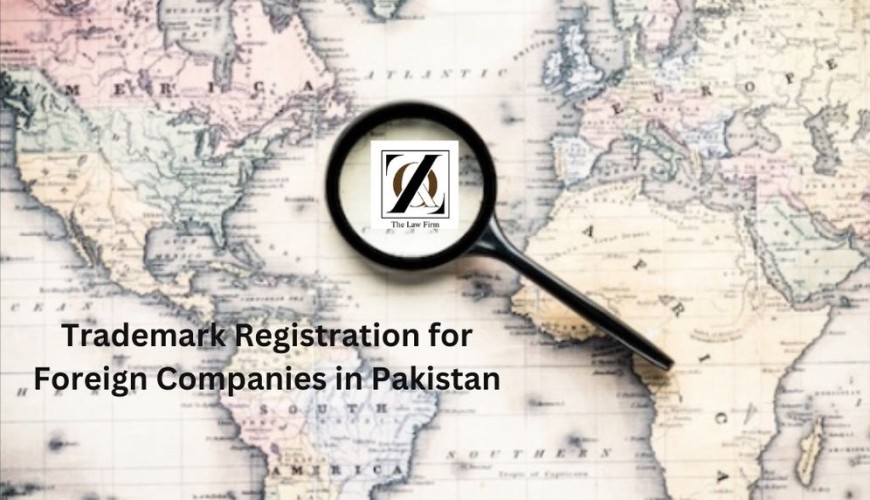In today’s globalized world, protecting intellectual property is a top priority for businesses expanding internationally. For foreign companies looking to operate or protect their brand in Pakistan, understanding the trademark registration process is crucial. This article provides a comprehensive guide on trademark registration for foreign companies in Pakistan, including its importance, the legal framework, step-by-step procedures, and key considerations.
Why Register a Trademark in Pakistan?
Legal Protection: A registered trademark grants exclusive rights to the owner, preventing others from using the same or confusingly similar marks.
Brand Identity: It helps secure your brand’s reputation and goodwill in the Pakistani market.
Market Expansion: Trademark registration can facilitate easier entry into Pakistan’s growing market and compliance with local regulations.
Licensing and Franchising: A registered trademark adds value by enabling licensing or franchising opportunities.
Legal Framework for Trademark Registration in Pakistan
Pakistan’s trademark laws are governed by the Trademarks Ordinance, 2001, which aligns with international standards and agreements such as the Paris Convention for the Protection of Industrial Property and the Agreement on Trade-Related Aspects of Intellectual Property Rights (TRIPS). However, Pakistan is not a member of the Madrid Protocol, which means trademarks must be registered directly in Pakistan rather than through an international application.
Eligibility for Trademark Registration
Any foreign company or individual can apply for trademark registration in Pakistan. However, a local agent or attorney must represent the applicant for filing and processing the application.
Types of Trademarks Registrable in Pakistan
Word Marks: Names, slogans, or phrases.
- Logos and Symbols: Visual designs or images.
- Combined Marks: A mix of words and logos.
- Non-Traditional Marks: Colors, shapes, or sounds (if they can be graphically represented).
Step-by-Step Guide to Trademark Registration in Pakistan
- Pre-Filing Considerations
Trademark Search: Conduct a comprehensive search to ensure the desired mark is not already registered or in conflict with existing trademarks.
Hire a Local Attorney: Foreign applicants must appoint a trademark attorney in Pakistan to handle the application and correspondence with the Intellectual Property Organization of Pakistan (IPO-Pakistan).
- Filing the Application
Submit the application to IPO-Pakistan.
Required Documents:
A clear representation of the trademark.
Applicant’s details (name, address, nationality).
Power of Attorney, authorizing the local attorney.
Proof of priority claim (if applicable) under the Paris Convention.
The fee varies depending on the class and type of trademark.
- Examination by IPO-Pakistan
The application undergoes formal and substantive examination to ensure compliance with legal requirements.
The examiner checks for distinctiveness and conflicts with existing trademarks.
- Publication in the Trademark Journal
If the application is accepted, the trademark is published in the Trademark Journal.
Third parties have two months from the publication date to file oppositions.
- Opposition Proceedings (if applicable)
If an opposition is filed, the applicant and the opposing party present their arguments before IPO-Pakistan.
The Registrar decides the outcome based on evidence and legal arguments.
- Registration Certificate
If no opposition is filed or the opposition is resolved in favor of the applicant, the trademark is registered, and a certificate of registration is issued.
The registration is valid for 10 years and can be renewed indefinitely.
Key Considerations for Foreign Companies:
- Local Representation: Appoint a reliable local trademark attorney or agent to ensure compliance and smooth communication with IPO-Pakistan.
- Language: Applications must be submitted in English or Urdu.
- Multi-Class Applications: Unlike some jurisdictions, Pakistan does not allow multi-class applications. Separate applications must be filed for each class of goods or services.
- Use in Commerce: While prior use is not mandatory, demonstrating use of the mark in Pakistan can strengthen your application.
- Enforcement: After registration, actively monitor and enforce your trademark rights to prevent infringement.
Costs and Timeline
Filing Fees: Vary based on the number of classes and types of trademarks.
- Attorney Fees: Depend on the complexity and scope of services.
- Timeline: The entire process, from filing to receiving the registration certificate, can take 12-18 months, depending on objections or oppositions.
Benefits of Partnering with a Local Firm
Foreign companies are encouraged to work with experienced law firms in Pakistan, such as Qadeer & Zaheer (www.qzlawfirm.pk), for seamless trademark registration. A local firm provides:
- Expertise in local laws and procedures.
- Efficient handling of objections and oppositions.
- Cost-effective solutions compared to international firms.
Conclusion
Trademark registration in Pakistan is a vital step for foreign companies looking to safeguard their intellectual property and establish a foothold in the country. By understanding the legal framework and partnering with experienced professionals, businesses can ensure their trademarks are effectively protected. If you are a foreign company seeking to register your trademark in Pakistan, consult a trusted law firm to guide you through the process and ensure compliance with local laws.









